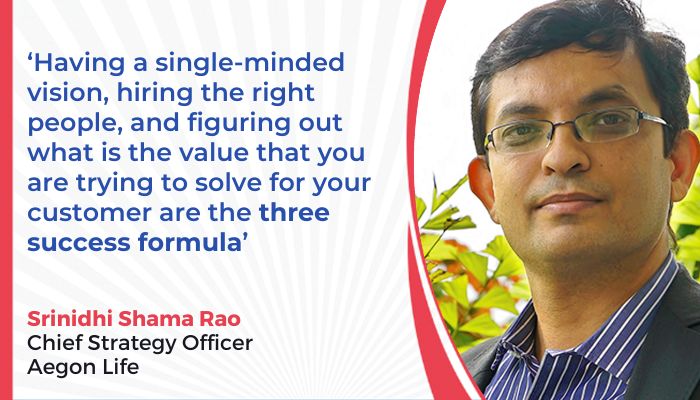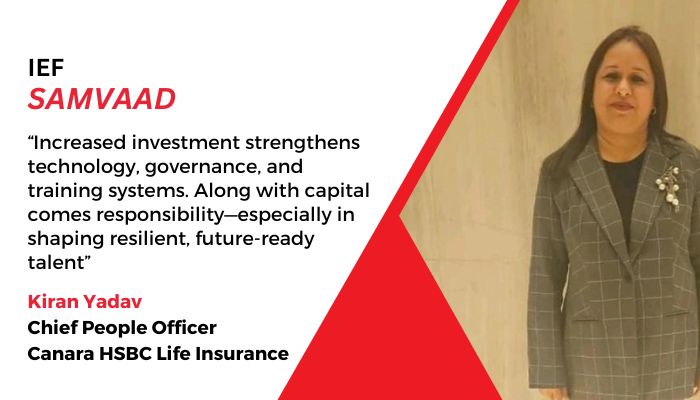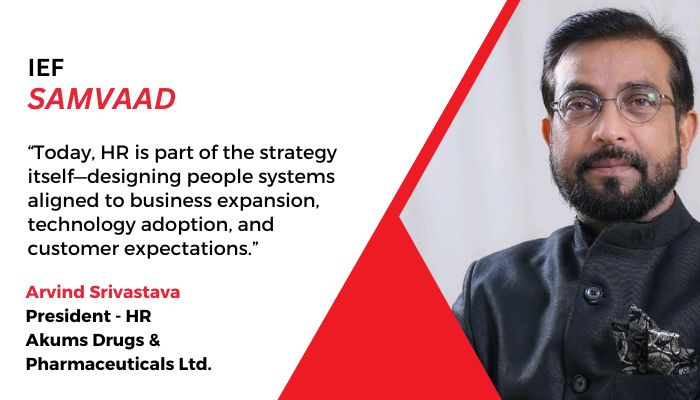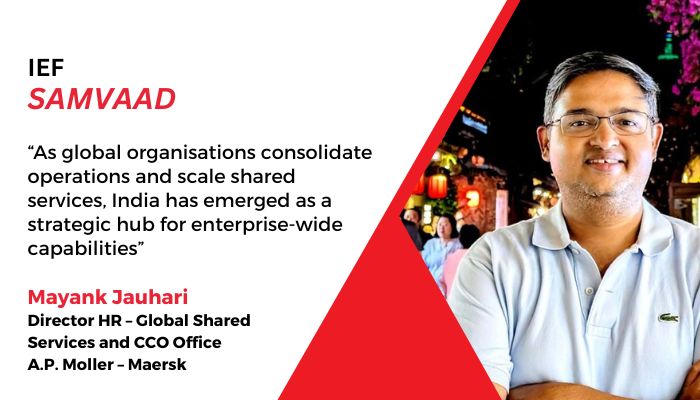Srinidhi Shama Rao, Chief Strategy Officer, Aegon Life, in a conversation with India Employer Forum on the success formula of all successful companies, building a good culture, hiring the right people, and recent start-up layoffs.
Q. Tell us a little bit about yourself.
I’m Srinidhi Shama Rao, the Chief Strategy Officer at Aegon Life. Basically, we are trying to create India’s first and only digital life insurance company. Before this, I was working with two startups, one as one of the founding members. The other one was a Math company where we were helping organisations to scale analytically, both from the perspective of creating a lot of analytics for food. So that they can consume and make the right decisions as well as help them through the change management that is required in the organisation, so that they can get value out of the technology. Before that, I was leading the retail and CPD portfolio for a company called New Sigma, which is again an analytic startup. I have a lovely wife and a 6-year-old daughter growing up very fast. I’m very passionate about badminton and cycling. I love hiking and mountaineering whenever I can.
Q. What differentiates a company with a sustained competitive advantage and performs well over the years from other companies? Is there one common success formula for all successful companies?
So, if you look at all the companies over the last 50 years that have done very well across industries, there are a few common traits that have differentiated the good ones from the bad. If you have read Jim Collins and other great authors who have abstracted some of the common factors across good companies versus great companies, what I have seen firsthand in the best of my consulting experience in terms of how they work, one thing is that at the topmost level, all companies have a single-minded focus. The focus is on how they want to add value to this world. So, that vision is super clear. They can align the entire organisational workforce, both people, technology and all the other resources, in one direction, with a single-minded focus on one particular goal or vision. Secondly, once you have that single-minded vision towards something, then comes the execution aspect. Can you hire the right people on board with the right skill set and the right attitude and make them work together towards that vision? So, an individual being a great person is one thing. Still, a bunch of great individuals work together to produce a typical result in something completely different, which is an entirely different skill set on the part of the leader. Can you hire the right people and rally them towards that one success? And thirdly, once you have these two things in place, what is equally important is whether you can figure out where your product fits in terms of what is the value that you are trying to solve for the customer and is that value significant enough for the customer and monetizable for you?
Q. How much does culture play a role in a company’s success? As a leader, how do you build a good culture?
There is a saying in the management world that culture needs a strategy for breakfast, lunch and dinner. So, culture is pretty much everything. There are a lot of different definitions of what is culture and people make their own meanings out of it, but for me, culture is the least common denominator of the behaviour that’s acceptable in the organisation. So, some very simple examples may not be the benchmark for everybody. For example, let’s assume that 8 a.m is your time in the workplace, do you tolerate people coming in later? This is a straightforward example, but that sets the goal. Even if somebody has left at 2 in the night, do you expect them to come back at 8 am with the same energy? If you’re tolerant of somebody who is coming five minutes late just because he is your favourite person for whatever reason, then the least common denominator of the worst behaviour that you can tolerate as an organisation becomes a part of your culture. Not everything is written on the board, so a lot of them are just unspoken.
Q. What’s your opinion of companies letting go of people? Is that not a difficult decision? What’s your opinion of the recent startup layoffs?
For a minute, let’s assume that we have been successful in hiring the right people. If you have hired the wrong people, you have to let them go. There is no other option. Otherwise, you will not survive as a company. So assuming we have the right people, a different set of things will come right. First of all, the direction in which the leader is going, versus the direction this person is going might not be aligned with each other. That’s one set of circumstances, so I call this micro-circumstances, where it is about the other person, despite being a good person and having a good record, is not able to deliver for whatever reason. So, these are all micro reasons that concern the person, and then there are macro reasons, like what happened with the late funding situation of startups. These are all macro situations, so let’s deal with these two things differently. First of all, if you figure out that there is a mismatch in terms of the person’s direction or performance, etc, obviously there is no other reason and no other option. You have to let the person go because we can’t carry dead weight. The thing is can you, as a leader, make sure that none of this is coming as a surprise? First of all, there are many loopholes right from day one of the employee joining, so any discordance in terms of performance is immediately highlighted and you can have open conversations so that nothing of this sort comes as a surprise. This is what we call radical candour in our language, where you can have tough conversations but still not lose the relationship.
Q. What’s your advice to startup founders and business leaders looking to build and expand their businesses? What principles should they follow?
So, one thing is, as we were talking about having a single-minded focus at any point in time, it’s not that you should not solve multiple problems, but not at the same time, especially in the first few years of the organisation. So, a single-minded focus on solving one problem at a time for the customer and putting your resources into that very effectively that’s point number one. Point number two is how do you ensure that you have enough cash so that your report does not topple for the small micro-economic impact? And then, we are talking about the founders being able to solve larger problems than just making money. You should solve an important problem for the country, economy, or ecosystem so that others value it. Last but not least, when we are talking about founders and leaders and having an impact and building great organisations, please think long-term. It’s effortless to take short-term decisions and go the wrong way, but you will always face situations where you need to take the right direction. What has worked for many companies is that if you always take a long-term decision in terms of what’s good for the company in the long run, you’re always likely to take the right decision.
Watch the full interview here: In Conversation with Srinidhi Shama Rao | Chief Strategy Officer | Aegon Life
About Srinidhi Shama Rao
Srinidhi helps organisations adopt AI-driven Business Strategy. He is a well known thought leader and futurist in the area of Applied-AI and creating data-driven organisational cultures, a keynote speaker, influencer, startup advisor and angel investor; has helped organisations across industry verticals create significant value through analytics/AI and digital adoption.
Srinidhi’s area of interest is the science and art of decision making and organisational performance – How to build systems and cultures that result in high performance, how to nurture key talent, what differentiates companies that perform, from others.
Srinidhi has 20 years of consulting and industry experience, working across industries, functions and geographies; He is currently the Chief Strategy Officer at Aegonlife, an insure-tech using technology and AI to create financial inclusion.






